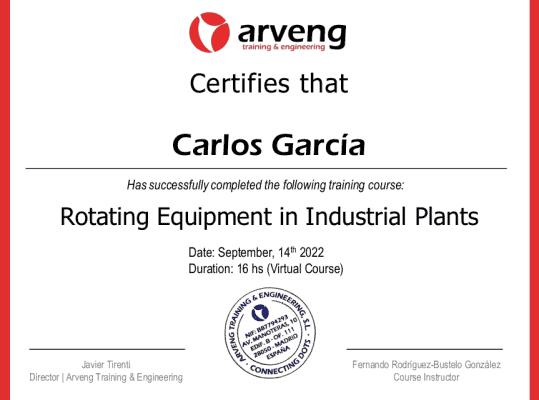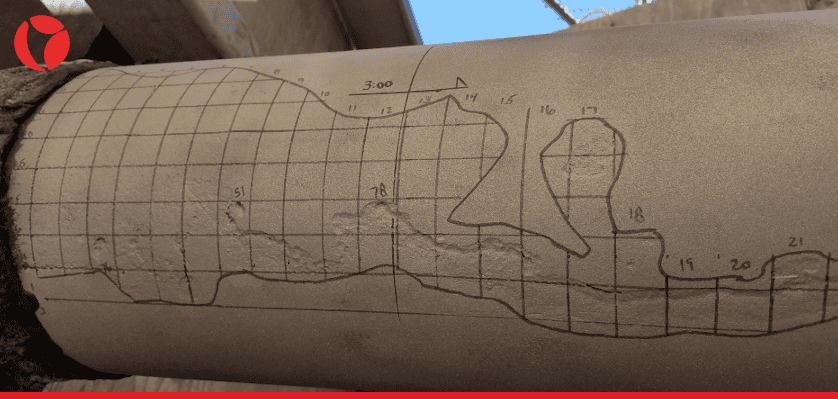Fitness for Service Evaluation & Repair of Piping Systems
| 28 Students |
| Duration: 12 hours |
| Certificate of Training |
When and where?
Dates: To be defined
Time: To be defined
Place: To be defined
In this course you will learn......
+ Vocabulary, terminology, and fundamental concepts.
+ The organization of the Design Codes, as well as their scopes and fundamental sections.
+ Best practices and lessons learned from different international projects.
+ To define the necessary requirements for a Fitness for Service Assessment and repair of piping systems, including remaining thickness calculation, fitness for service assessment procedures, main welded repairs, and more.
+ Fitness for Service Assessment and Repairs of piping systems according to the codes: ASME B31G; API RP 579-1 & ASME PCC-2. Thickness evaluation after corrosion degradation, crack evaluation, remaining life. Welded repairs, mechanical repairs, composite repairs.
-
Instructor-led training course
-
Downloadable study notes
-
Solved case studies
-
Solved examples
-
Reference material
FREQUENTLY ASKED QUESTIONS (FAQ’s):
How can I enroll in this course?
To enroll in this course you have to follow the below steps:
- Click on “Add to cart”
- Complete the purchase process using the payment options available.
- You will receive a confirmation email.
- On the call date, start training your skills!
Can I register and pay for a live course for a 3rd party/more than one person?
To enroll a 3rd party/more than one person you have to follow the below steps:
- Change the number of products of your cart (1 by default):
a. Change the number of products before clicking on “Add to Cart”.
b. Directly on the cart screen, there is a button where you can increase or decrease the amount of products to buy. - State the Name and Surname of the participants in the observations field when completing the purchase.
Are there discounts for groups/companies?
Yes! Contact us indicating your needs and we will find the most convenient alternative for you.
Terms and conditions
An applicant who withdraws from the course 2 working days or less prior to the course start date will entitle ARVENG to retain 10% of the tuition fee as an administration fee. Once the course has started, no refund will be made.
All ARVENG courses are subject to possible changes of dates that will be communicated as soon as possible. ARVENG is not responsible for the expenses incurred for travel-related contracts (hotels and flights), so we recommend that they are not made well in advance and if they are made, they should be contracted with cancellation or change insurance.
Get a discount for early payment if you register 15 days before the start of the course, write to training@arvenggroup.com and we will inform you how to proceed.
Instructor-led training course in adult learning format.
The course follows the “learning through experience” methodology. A series of discussions, individual exercises and simplified case studies provide practical knowledge to implement in the field. With the help of the Study Notes and with the assistance of the instructor, participants will gradually progress through the course.
Who should attend?
This course is intended for graduates (or soon to be), designers, freelancers, technicians and engineers involved in calculation, design, selection, manufacturing, safety, quality and maintenance of systems and equipment used in Industrial Processes.
Previous knowledge of this subject is not required to attend to the course.
Training objectives
The main objective of this course is to transfer to participants the theoretical and practical skills required in projects, obtained from experience and sound engineering practices.
What to expect?
Become familiar with the vocabulary, terminology and fundamental concepts.
Know the organization of the Design Codes, their scope and fundamental sections.
Benefit from best practices and lessons learned from different international projects.
At the end of the course, participants will be able to define the necessary requirements for a Fitness for Service assessment and repair of piping systems:
- Remaining thickness calculation.
- Fitness for Service assessment procedures.
- Evaluation of material loss.
- Main welded repairs.
- Major mechanical repairs.
- Repairs with composite materials.
CONTENTS AND STRUCTURE OF THE COURSE: 12 HS
Life cycle management of a piping system
Failures evaluation methods
Scope, organization and intent
Glossary of terms
Failure types,
Orientation
Evaluation Methods
Levels 1, 2, and 3
Proposed Case Study: calculation of remaining stress in corroded lines
Organization
Intent
Glossary of terms
Procedures for Fitness for Service assessments in piping systems.
Applicability and limitations
Evaluation levels and acceptance criteria
Remaining life assessment
Damage mechanisms
Thicknesses, MAWP and stresses for FFS evaluations.
Generalized Material Loss Assessment
Localized Material Loss Assessment
Evaluation of fissure type failures (cracks)
Proposed Case Study: Serviceability Assessment of Corroded Components
Part 2 – Welded Repairs
Art. 201 – Butt welded insert plates in pressure components
Art. 206 – Steel reinforcement sleeves
Art. 207 & 212 – Patches with fillet welding
Art. 210 – Welding in CS pipe service
Part 3 – Mechanical Repairs
Art. 304 – Excavation of defects and repair with welding
Art. 305 – Repair of flanges and conversion
Art. 306 – Repair with mechanical clamps
Part 4 – Repairs with composite materials
Part 5 – Examination and tests
Proposed Case Study: calculation of reinforcement jackets thickness
EXAMPLE OF A CERTIFICATE ISSUED BY ARVENG:

REQUEST MORE INFORMATION!
Please send us your query and we will reply as soon as possible.
About Instructors

Reviews
Average Rating
Detailed Rating
| Stars 5 |
|
0 |
| Stars 4 |
|
0 |
| Stars 3 |
|
0 |
| Stars 2 |
|
0 |
| Stars 1 |
|
0 |
Be the first to review “Fitness for Service Evaluation & Repair of Piping Systems” Cancel reply
You must be logged in to post a review.
| 28 Students |
| Duration: 12 hours |
| Certificate of Training |



 WhatsApp
WhatsApp
There are no reviews yet.